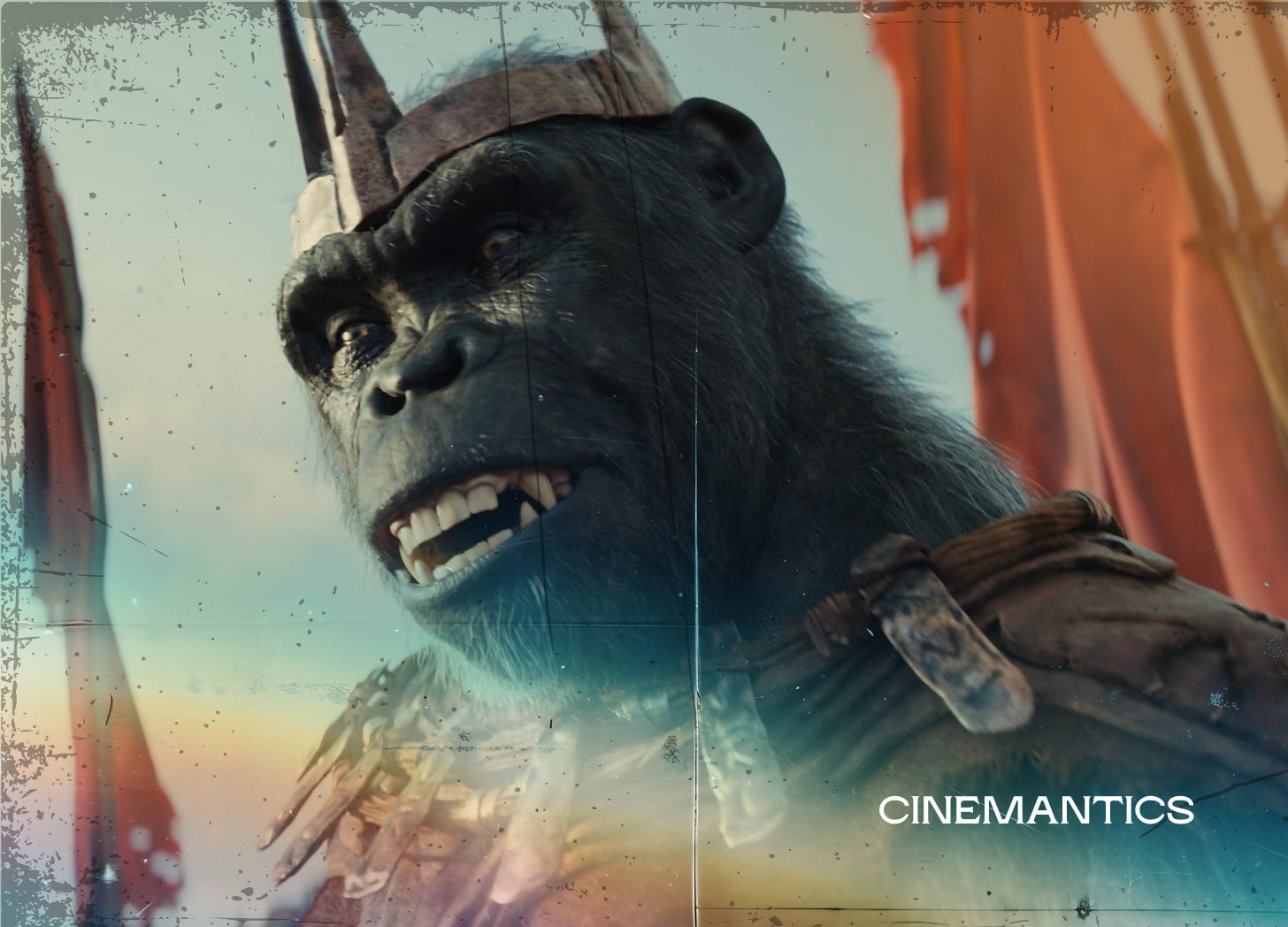Kingdom of the Planet of the Apes | Review
What a wonderful ape!
Going into Kingdom of the Planet of the Apes, I was a little concerned that the Planet of the Apes movies might have a Terminator problem. Part of what makes Terminator a tricky franchise to nail is that the nuclear apocalypse and future war the characters are trying to prevent aren’t that interesting.
Planet of the Apes could have had the same problem: After the iconic original took place entirely in ape society, the franchise went back in time after a bizarre follow-up, Beneath, ended the ape-world with a bang. The next two films, Escape and Conquest, in the original series were set during anthropocentric times, telling the story of the downfall of human civilization. The final film in the series, Battle, was a half-hearted attempt to tell a story set in the middle of the rise of the apes and the fall of humanity.
After fits and starts, the most recent trilogy also played within the same timeframe as the final three of the original series: Rise told the beginning of Caesar's rise, Dawn set its conflict in the middle of a collapsing human civilization ravaged by the virus, and War put the capstone on the reign of the human race and the rise of the apes. This raised a central question for the franchise: Were there any stories worth telling during the reign of the apes, or were the only stories worth telling about conflicts between humans and apes?
Fortunately, Kingdom has no shortage of interesting ideas about ape civilization. But that’s also the film’s biggest flaw: it stuffs so many plot points into its near-two and a half hour runtime that it never keys in on a singular ideological conflict to drive the story or characters. The result is a quality film that’s another feather in the cap of Hollywood’s most underrated franchise, but that leaves a lot of meat on the bone when it comes to developing a coherent ideological struggle for ape civilization.
Kingdom, like the preceding trilogy, is a joy to watch. The CGI work is spectacular, and it feels like the filmmakers put an extraordinary amount of effort into making sure every shot of the apes counts. There’s also an undeniable forward momentum to the picture, as director Wes Ball and writer Josh Friedman keep things singing along effectively. While no single set-piece tops any of previous director Matt Reeves’s work, there are a couple of genuinely nail-biting moments, like a particularly brutal action scene set in the middle of a bridge over a rushing river.
But what Kingdom lacks, or only hints at, is a coherent ideological struggle over how to organize ape society between its characters. (Spoilers ahead)
For example, the film’s best stroke of genius is the character Raka, an old orangutang who is the last survivor of a tribe who worshiped Caesar as an explicitly religious figure. Raka offers insight on how a portion of ape society has chosen to remember and interpret Caesar’s legacy, and demonstrates a sense of warmth that conveys the compassion of their image of Caesar.
But he never comes into direct conflict with Proximus Caesar. Leaving the audience wanting more is almost never a bad idea, but the film could have set the stage for an ideological conflict between two clearly opposing interpretations of Caesar’s legacy. Proximus hijacks Caesar’s role as leader of the apes as he seeks to access human technology to ameliorate the apes’ inability to innovate technologically. It’s a sensible motivation for a memorable villain, but it could have been so much stronger with a clear foil among our protagonists.
Noa, this film’s new protagonist, isn’t much more than a blank slate. The unveiling of Mae’s motivations as the film reaches its climax makes for some entertaining suspense, but revealing her plan earlier in the film could have made for a more interesting conflict.
I’m sounding much more critical about Kingdom than I mean to be. It really is worth seeing in theaters, and while it doesn’t reach the heights of its predecessors, it’s a more-than-effective set-up for a new series of films, and its ending does leave viewers wanting to see where the series goes next. Perhaps the fact that I’m this critical is a credit to this franchise’s ability to take an absurd premise totally seriously and produce something far more intelligent than a lot of ordinary blockbuster fare. I can’t help looking at this series and wanting to proclaim to ape-kind everywhere: What a wonderful franchise.




Quit monkeying around with this ape puns!
Love that you went *bananas* for this movie! (Sorry, there are just too many jokes to make)